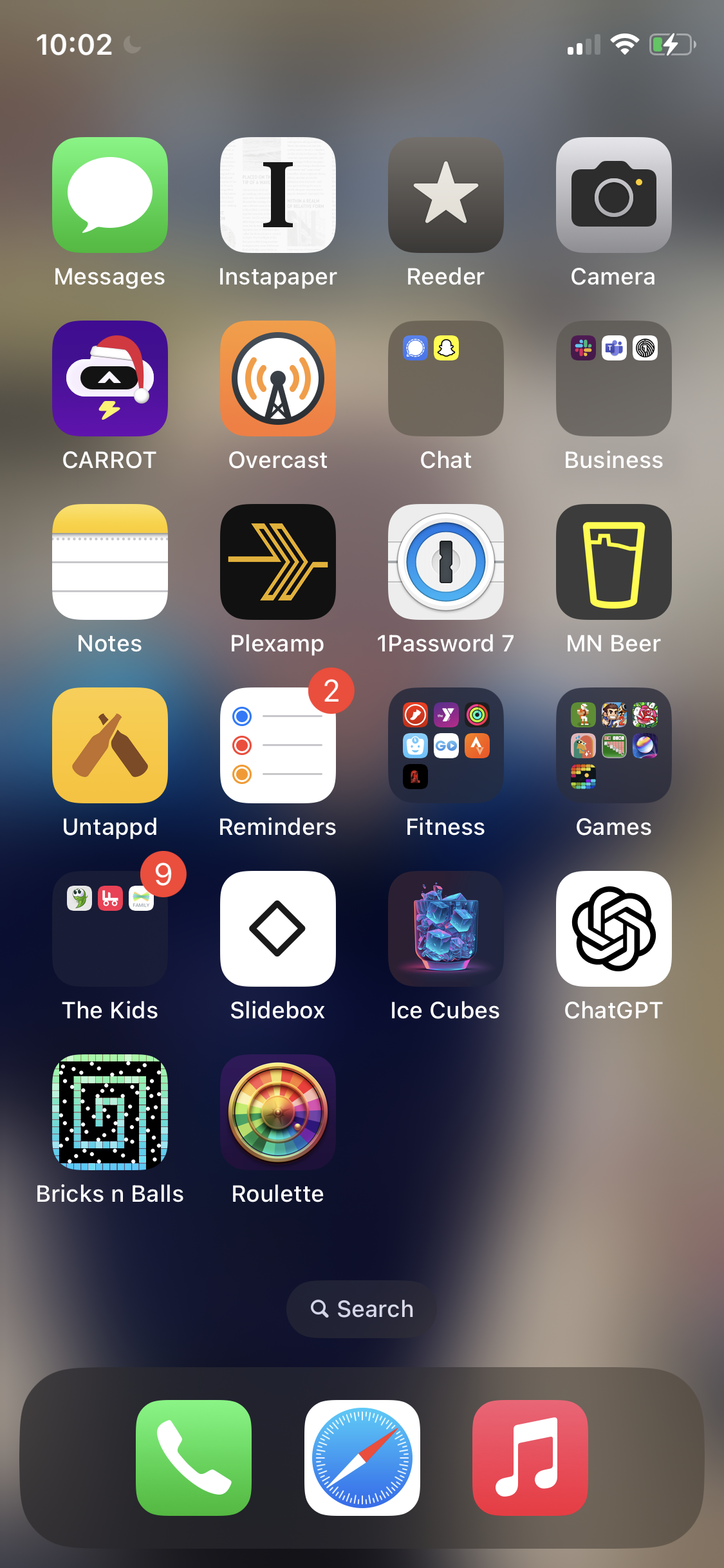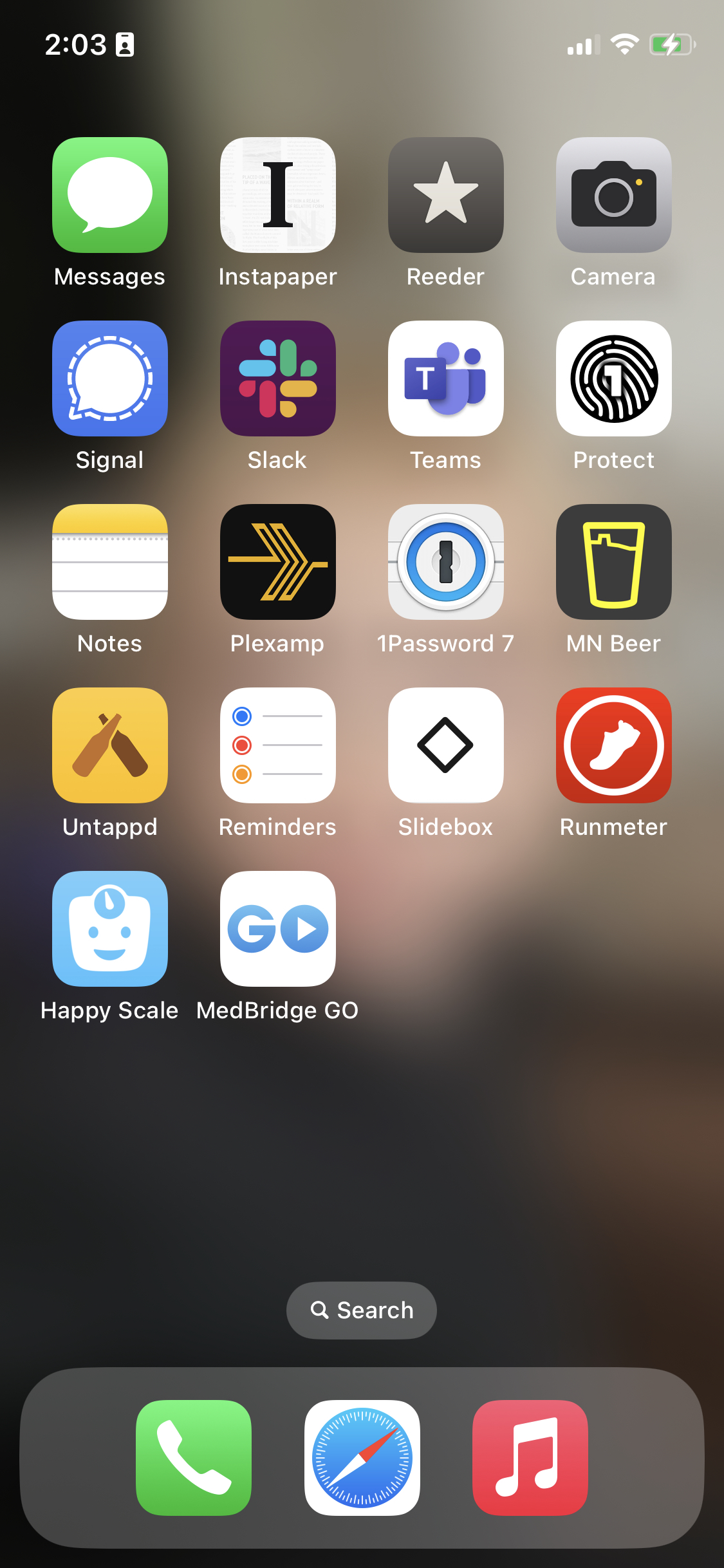"You become more resilient, and your body learns that the anxiety and stress isn't needed because there is no threat to losing anything when there's always more ways to gain what you want or need," says Papetti. "The only thing that's certain in life is uncertainty, so embodying an abundance mindset that trusts you'll be safe in the uncertainty is the secret to living a life of greater gratitude, ease, and satisfaction."
Great advice in here for helping you to adjust your mindset. The journaling tip and the celebrating the wins of others tip are resonating with me as of late.
Continue to the full article
→
I anticipated navigating other challenges, like how to deal with the cognitive dissonance of working for big tech. Could someone who worked for big tech use a flip phone? Yet I liked the idea, argued by Hari, Williams, and Newport, that we need to be aware of technology’s designs and ensure that tech is working for us rather than against us. I didn’t want to throw the baby out with the bathwater when it comes to technical innovations, but I grew increasingly skeptical that my smartphone was working for me.
This whole article combines many disparate sources (like Cal Newport's Digital Minimalism and Rolf Dobelli's Stop Reading the News) into a cohesive manifesto for why we should stand up and reclaim our collective attention spans.
It actually motivated me to take some action.
Last night, I went through every app on my phone and deleted the ones I no longer use. I wasn't too picky though; if I had even a slight inkling that I might need it in the future, I kept it.
I went from 314 apps to 133.
133 still seems like too much to me, but just imagine the cognitive and infrastructural burden that 181 apps was inflicting on me and my phone!
All that wasted bandwidth to download updates.
All those wasted notifications attempting to get me to come back in.
My home screen went from this:

to this:

It's step one of being intentional with my technology, which is subsequently the first step towards getting my attention back.
Comparing these two screen shots is making me excited to make more cuts. Some of these apps will go away after we wrap up with a client project in the next couple weeks (like Teams and Protect) or when I finish up physical therapy (like Medbridge Go).
Others (like Untappd or MN Beer) are ones that don't really need a front page billing all the time in my life.
More cuts to come in the weeks ahead, to be sure!
Continue to the full article
→
While travel does expand and stretch the horizons of what we know about the world, it is not the answer we’re looking for in times of unrest. To strengthen the health of the mind, the venue to do that in is the one we are in now.
It is location-independent, and always will be.
The key is not to discard The Box of Daily Experience and find a new one — it’s to warmly embrace the one that we have now — with its joys, its flaws, and everything in between.
I’ve definitely fallen prey to the use of vacation as a substitute for facing my own problems.
This article (complete with cute illustrations) serves as a great reminder that value can be derived from the monotony of our daily lives.
Continue to the full article
→
We manic worriers need not sarcasm but supportive and intelligent company to give us the love we need to dare to look back at the past – and the insight with which to try to do so. Our feeling of dread is a symptom of an ancient sorrow that hasn’t found its target in the here and now; and our ongoing quest and alarm is a sign that we keep not finding anything in the outer world that answers to the horror of the inner one.
Continue to the full article
→
Last night, I posted an article here called “Everyone needs to grow up.”
I shared it because I’ve personally felt drawn to “childish” things lately, and I’m personally trying to make sense of it… How do you find a balance between serious adult responsibilities (raising a family, managing a team, etc.) and needing a break from that?
A good friend saw that post and sent me this article, which acts as a great counterpoint. (He may be the only reader of this blog, honestly.)
I’m of the opinion that the only way to be an adult is to be willing to meet people where they are and care for them in the way they want to be cared for. It is about setting healthy boundaries; it is about knowing who you are and what you, yourself, can do and can handle. It is about planning for the long-term.
The concept of knowing who I am is absolutely top of mind lately. My wife and I have been considering our own individual values and discussing how those mesh, mostly as a way to understand what we want to instill in our children, but also to figure out who we are as individuals.
One thing I’ve realized while undergoing this thought experiment is that I feel like I’ve spent a lot of my life suppressing who I am as a way to maintain neutrality and not rock the boat.
An example: I really like using “big words”. I find it hard sometimes to express my thoughts, and it makes me happy when I find a new word which poignantly expresses a thought. But then I often avoid using those words because I don’t want to be seen as aloof or pretentious.
Anyway, I think some people are really in tune with who they are and are unafraid to show that to the world. Being an adult, for me, is finding a way to be comfortable with who I am and not ashamed of it.
I don’t think people are adult babies now, at least not offline. Although I do think it’s maybe harder than ever to be an adult. The traditional markers of transitioning through life-stages are evaporating; basically all that’s left to guide you are bills and literature. The structures that created our modern idea of adulthood have collapsed — which is to say governments aren’t subsidizing things like homeownership like they did after the Second World War — and it’s easy to feel adrift.
Boy, ain’t that the truth. We have a playbook for life all the way up through high school. From there, it’s a boot out of the nest, and it is up to us individually to figure out how to adult.
Continue to the full article
→
There is no reassurance and no final verdict. There might be a next life, there might be a remade world in which none of this matters, but it is also quite possible that such places will have no need for art or philosophy, though I do find it hard to imagine a fleshly paradise without dancing. For us, right here, there’s only the work and the living, and making space for it, or not.
A real bummer for you this evening, and for that, I apologize.
I think a big part of growing up and dealing with anxiety and depression is figuring out how to deal with these simple, indifferent truths.
And I guess this evening, it’s hitting me a little harder than I’d like to admit to you, dear anonymous reader.
But I guess in some ways, it makes me happy to know I’ve made a few people’s lives a little less stressful this week through my work, and I’m planning on spending my next few days (through this 18” snow storm we’re expected to have) with my wife and kids, which also makes me a little more happy too.
Continue to the full article
→
Most companies don’t get it. Most people don’t get it. To them, problems are a sign of failure. They think that the default state is perfection. They believe that if we just worked hard enough — planned hard enough then there wouldn’t be any problems. The only reason we fall from that perfect state is that someone, somewhere screwed up.
But that’s not reality. The default state for our reality is chaos. It is ruin. It is entropy and erosion and human nature. We build things to make a better world, and yeah, part of that is people failing. People fail all the time. That sucks, but you’re not going to change it. So you might as well do a good job living with it.
This is really what we all need to cope with. The times we live in are chaotic, filled with uncertainty, fear, and a sense of impending doom. So much so that even our children are suffering at historic rates.
But as I deal with my own struggles to make sense of things, I continue to fall back on accepting that we've always lived in a world that is rife with turmoil. All we can do is go along for the ride, appreciate what we have, and be grateful for those who we can lean on to help navigate it together.
Continue to the full article
→
There is too much in this article to even grab a single pull quote from. The entire thing is worth reading from top to bottom.
It did make me think a bit about how I can apply some of this knowledge to my own life. I personally struggle with “what will I be when I grow up” from time to time, and I think even simply knowing that this is not abnormal is helpful.
Continue to the full article
→
I think what many people really want from money is the ability to stop thinking about money. To have enough money that they can stop thinking about it and focus on other stuff.
But that ultimate goal can break down when your relationship with money becomes an ingrained part of your personality. You struggle to break away from focusing on money because the focus itself is a big part of who you are.
This, 100%, is me… and if you can relate to that yourself, give this whole article a read.
Continue to the full article
→
Under pressure, our free time – our entertainment time, our recovery time – tends to devolve into mindlessness. You know, scrolling social media. Re-watching the same show repeatedly. Numbing and zoning out. Nobody has the energy to learn how to play Axis & Allies after working for 12 hours.
Similarly, at work, people under pressure tend to simplify. We spend less time engaging socially, having fun, and experimenting. We crack down into Serious Business Mode.
While this can be a reasonable adaptation to get through a rough patch, it’s unsustainable. As we get burnt out, it gets even harder to play, reinforcing the cycle. All work and no play makes Jack something something.
Humans need play.
Continue to the full article
→


